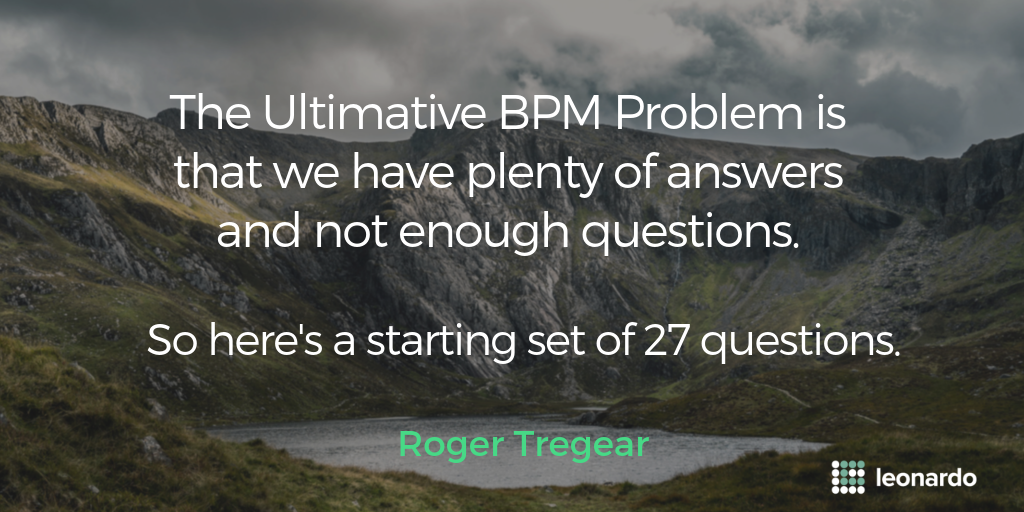 She who dies with the most answers wins. We seek the truth. We want to know the answers.
She who dies with the most answers wins. We seek the truth. We want to know the answers.
Paul Harmon started me thinking recently when he invited members of the BPTrends Discussion group on LinkedIn to “describe the purpose of Business Process Management in 160 characters, including spaces and punctuation.” Not easy to do – have a go at it yourself. It felt like I was crafting The Ultimate BPM Answer, which, of course, begged The Ultimate BPM Question.
That got me thinking that The Ultimate BPM Problem is that we have plenty of answers and not enough questions. So put all the answers aside for a moment and help me to work out what are the most important questions in Business Process Management?
Assuming we can safely put the questions and the answers together in this universe, is it possible to agree on a finite set of key BPM questions to guide our thinking, writing, analysis, and development activities? What would those questions be? Before we worry about the answers, perhaps we should agree on the questions.
So here’s a starting set of 27 questions. That must be too many. There will be others to be added. I’ve explored this a little elsewhere and had some interesting feedback – thanks Gaby and others.
Theme A: Creating a shared understanding resulting in practical action
- How would my organization be different if we implemented process-based management?
- What is the link between organizational strategy and business process management?
- How do I create exciting BPM visions that could lead to entire new process visions for my organization?
- What are the compelling reasons for my organization to adopt process-based management?
- How can we capture executive attention and transform it into commitment?
- Why should my organization invest now in developing a process management capability?
- How can we develop a critical mass of people interested in BPM?
- Why should our day-to-day operational managers care about process management?
- How can we make the “idea of process” highly contagious?
Theme B: Modeling, measuring, and delivering process improvements
- How can I use process models for improved engagement and communication?
- What are innovative ways to model, beyond complying with dominant process modeling standards?
- How do my process models best inform the software development lifecycle?
- How can we measure things that are impossible to measure?
- Can we justify the cost of measurement?
- How can process performance be integrated with financial, unit, and individual measures?
- How can we make sure that the To Be becomes the new As Is?
- What are the current limitations of, and future prospects for, BPM Systems and related technology?
- Are you seriously suggesting “continuous improvement” with all the disruption that will bring?
Theme C: Creating an environment that sustains business process success
- What does it mean to be “accountable for process performance”?
- How many process owners does it take to change the operational performance of a light bulb?
- How can I be accountable for the performance of something that I do not control?
- What is the ROI for a Process Center of Excellence?
- How do we integrate BPM with other management disciplines?
- What is our realistic pathway to increased BPM maturity?
- How can we make process-based management truly sustainable?
- How can we create and maintain a process mindset throughout our organization?
- If it takes 3 years to raise BPM Maturity, why are most organizations still at such low maturity levels after so many years?
How many questions should we have? Not sure. Probably not 27 (or 42!). The grouping and order of the questions are likely to be important. Maybe a handful of key questions that can focus our thinking and clarify our messages.
If you were allowed just five BPM questions, what would they be?
I’d love to hear your opinions. Let’s continue the discussion at below or you can contact me at r.tregear@leonardo.com.au. or on the twitters - @rogertregear
This article was originally published on www.bptrends.com




